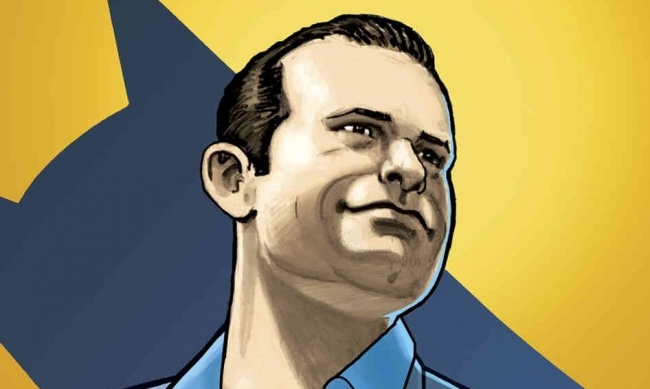Tuesday night is the start of Yom Kippur, the Jewish Day of Atonement. So perhaps it is appropriate for an industry founded largely on the imagination and entrepreneurial skills of American Jews that we unexpectedly received news that one of comics’ most egregious foundational sins was redressed last Friday. I speak of course of the announcement that DC Entertainment made to The Hollywood Reporter, of all places, that Bill Finger would receive long-overdue credit for his role in the creation of Batman (see "DC Gives Finger Credits on 'Batman v Superman: Dawn of Justice' and 'Gotham'").
A Long Dark Night. Finger, as most ICv2 readers know, was instrumental in turning Bob Kane’s raw idea for a bat-themed crimefighter into the Dark Knight that we know today. Working with Kane from the earliest days, Finger fleshed out Batman’s origin, motivation and secret identity. He co-created core characters and concepts from Robin to Commissioner Gordon to the Joker and gave those early Batman stories the aura of darkness and mystery that established Batman as the second great pillar in the DC pantheon, solidifying the publisher’s position as the progenitor of the Golden Age.
The fact that Kane became a celebrity and a millionaire, winning back creator rights to Batman by claiming he was under 18 when he signed them away to DC, while Finger died in poverty and obscurity, was a notable injustice even by the shady business standards of the Golden Age. For decades, creators have fought to get Finger’s contributions recognized. The Eisner Awards in 2005 instituted a Bill Finger Award specifically recognizing writers whose work was under-appreciated during their careers.
Settling the Old Family Business. Friday’s announcement by DC comes relatively close on the heels of Marvel’s settlement with the family of Jack Kirby last fall, in which the King will get formal credit for his co-creation of the Marvel Universe (see "Marvel Settles with Kirby Heirs!"). Is there perhaps hope that the families of Jerry Siegel and Joe Shuster might finally get some resolution, despite the courts’ refusal to hear further appeals? (see "Superman Creators Lose on Appeal"),
Considering that these cases have dragged on for the better part of a century, it’s notable that some of the world’s richest corporations have changed their tune regarding the role of the working class creators whose imaginations built their gold-plated IP portfolios. Yes, this announcement is timed to the start of a new season of Gotham, featuring characters and concepts developed by Bill Finger, as well as the upcoming Superman-Batman movie. And it’s a burst of good publicity for DC at a moment when the company is taking a lot of heat for recent editorial decisions.
But there were dozens of occasions over the past few decades when DC could have settled this, just as Marvel could have acknowledged Kirby, Ditko and the other architects of its creative success. Instead, generations of executives stuck to their guns, legally denying what was morally clear to just about any observer.
It said something about the comics industry that its largest publishers did not mind being famous for ill-treatment of creative talent. Not something good, but something true about the social pathologies and class hatreds between sharp-elbowed businessmen and dreamy-eyed artists--all mostly emerging from the same ethnic and class backgrounds--who created the American comics industry.
Exorcising the Demons. Perhaps the Big Two have finally become big enough within the entertainment world that they can no longer abide the bad PR that comes from their most valuable IP being built on a veritable Indian graveyard of legalized expropriation.
But it also seems a bit like some rich folks just bought the local haunted house, hired an exorcist to get rid of the ghosts, and are now moving ahead to turn the charming old place into upscale townhouses. What’s comics without its ancestral hatreds, its old feuds between evil publishers and exploited creators, its seedy gangster/shyster roots visible just barely beneath the surface? Just another business, I guess.
Like Yom Kippur itself, a holiday marked by reflection rather than celebration, the occasion of comics’ latest atonement is one for putting the sins of the past behind and starting the next chapter with a clean slate. Congratulations to the Finger family and here’s hoping that the money and good spirits keep flowing to all who deserve them.
Programming Note. Finally, excuse me a moment to indulge in a personal announcement. If you enjoy my observations about comics and the business of popular culture, I am now writing about those issues in a different format (shorter, and more frequently) for a slightly broader audience at Forbes.com. Yes, that Forbes.
When I mentioned this to someone last week in an email, they responded that "if you had told me when I was in college that Forbes would have regular coverage of the comics business, I’d have eaten a copy." But there you go.
You can see my posts in the Media and Entertainment section or directly on my Contributor page. You can also follow me on the site, post comments and tweet up stories of interest, which are all great ways to tell Forbes that you value coverage of this industry.
I still plan to maintain my bi-weekly column here at ICv2 as long as Milton and you, my readers, will have me.
--Rob Salkowitz (@robsalk) is the author of Comic-Con and the Business of Pop Culture.
The opinions expressed in this column are solely those of the writer, and do not necessarily reflect the views of the editorial staff of ICv2.com.

Column by Rob Salkowitz
Posted by Rob Salkowitz on September 21, 2015 @ 6:35 pm CT



